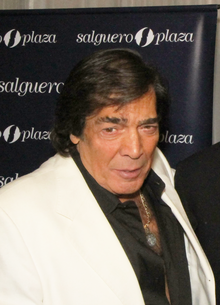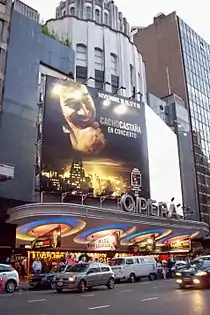Cacho Castaña
Humberto Vicente Castagna (June 11, 1942 – October 15, 2019), better known as Cacho Castaña, was an Argentine singer, songwriter, pianist and actor.
Cacho Castaña | |
|---|---|
 Cacho Castaña in 2012 | |
| Born | Humberto Vicente Castagna June 11, 1942 |
| Died | October 15, 2019 (aged 77) Buenos Aires, Argentina |
| Occupation | Singer, songwriter, pianist, actor |
| Years active | 1959–2019 |
| Spouse(s) | Andrea Sblano
(m. 2006; separated 2011) |
Biography
Born in Buenos Aires, Cacho Castaña developed an interest in music during his early years, and by age fourteen, he was a piano teacher. Raised in modest circumstances in the Flores neighborhood,[1] he worked with his father, a shoe cobbler, until age 16.[2] He began his career in music in his teens as a pianist in Oscar Espósito's orquesta típica, one of numerous such groups that performed tango music at the time,[1] and also performed in the Chamamé folk genre.[3]
Castaña became famous as a bolero singer during the 1970s, performing on Argentine television programs such as Tiempo Final and Un Cortado, among others.[3] He authored numerous hits, including Me gusta, me gusta ("I like it, I like it"), Lo llaman el matador ("He's Nicknamed the Killer") and Hay que encontrar al ladrón ("The Thief Must be Found"), and his signature bolero: Para vivir un gran amor ("To Live a Great Love").[1] His lyrics became known for their extemporaneous and often autobiographical style, which he described as "writing as I would speak."[2][3]
He is much better known, however, for his contributions to tango music: some of his compositions are considered classics by his fans, including Qué tango hay que cantar ("What Tango Must One Sing", with Rubén Juárez), Garganta con Arena ("Throat full of sand", an homage to Roberto Goyeneche, his mentor), "Tita de Buenos Aires", (Tita de Buenos Aires, dedicated to Tita Merello), A dónde vas? Quedate en Buenos Aires ("Where are you going? Stay in Buenos Aires"), and his ode to the Flores neighborhood: Café la Humedad.[1] Castaña composed around 2,500 songs, of which 500 have been recorded.[3] He produced 44 records,[3] of which fifteen became gold records (over 20,000 sold, per CAPIF ratings),[4] and ten, platinum (over 40,000 sold).[5]

Castaña also starred in thirteen Argentine films, including two for which he wrote the score, El mundo que inventamos ("The World We Created", 1973) and Los hijos de López ("López's Sons", 1980); numerous picaresque comedies; and in Felicidades (2000). A confirmed bachelor for much of his life, his numerous relationships included one with Susana Giménez during the 1970s (Giménez would later become a top-rated talk show hostess in Argentina).[2] He ultimately married Andrea Sblano, the 27-year-old daughter of a close friend, in 2006; among his other close friends was former President Carlos Menem.[2] His television appearances in later years included a cameo on the popular Argentine telenovela, Los Roldán. He earned a Konex Award in 2005 for his work as songwriter, and his tango album released that year, Espalda con espalda ("Back to back") earned a Gardel Prize.[6] He was invited to perform "with all the other monsters" in Leopoldo Federico's series, Selección Nacional de Tango Argentino (an event he considered "the happiest day of my life"), and was inducted into the National Academy of Tango in 2007.[1]
Castaña's career declined during the 1990s, but rebounded after 2003, and he became active in Argentina's stage and festival circuit. He headlined numerous Corrientes Avenue shows, and was a regular performer in the National Peña Festival, in Villa María.[7] A heavy smoker, he developed emphysema in later years, and was twice hospitalized as he prepared to appear in shows.[5] He and his wife opened a children's clothing boutique, Las Castañitas.[8] Their marriage suffered, however, and they separated in 2011.[9] He was again hospitalized following the separation, and made a speedy recovery.[8]
After two weeks hospitalized, Cacho Castaña died on October 15, 2019.[10]
References
- "Cacho Castaña at the Academia". Todo Tango. Archived from the original on 2014-01-04.
- "Cacho Castaña: Yo seguro que me voy al infierno". Clarín.
- "Homenaje: Cacho Castaña". Todo Tango. Archived from the original on 2011-09-28.
- "Discos de Oro y Platino". CAPIF. Archived from the original on 2011-07-06.
- "Cacho Castaña: Un día sos Gardel y al otro día no sos nada". Clarín.
- "Cacho Castaña". Fundación Konex. Archived from the original on 2012-03-17. Retrieved 2011-08-07.
- "Festival de Peñas: Villa María prepara el show". La Voz del Interior.
- "Cacho visitó a su ex". Pronto. Archived from the original on 2011-10-08.
- "Se separó Cacho Castaña". Pronto. Archived from the original on 2011-10-08.
- Clarín.com. "Murió "Cacho" Castaña". www.clarin.com (in Spanish). Retrieved 2019-10-15.
External links
- Cacho Castaña at IMDb
- Cacho Castaña at Cinenacional.com (in Spanish) (archive)